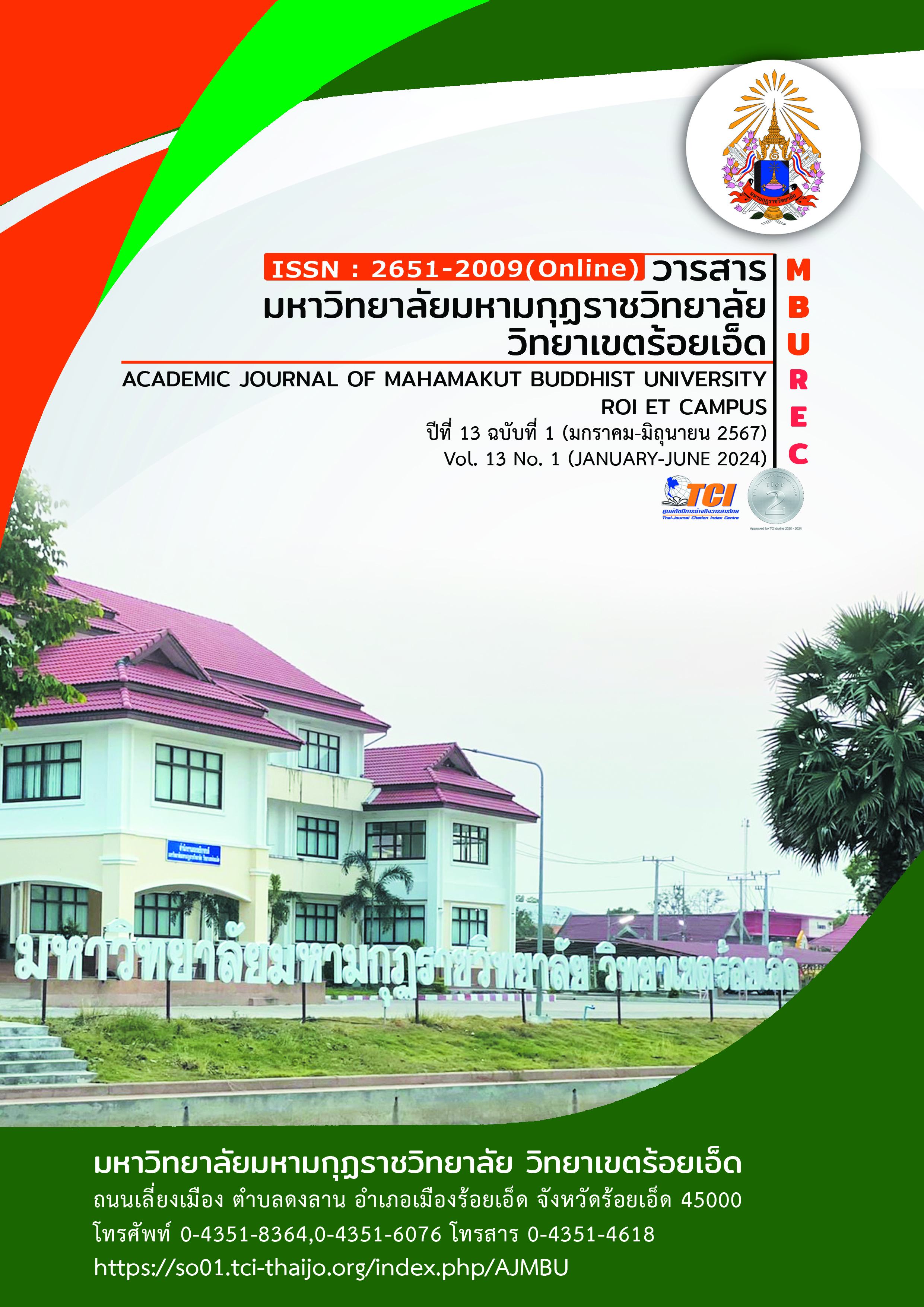THE APPLICATION OF THE PRINCIPLE OF INDHIBAT 4 IN THE PERFORMANCE OF DUTIES OF ADMINISTRATIVE ORGANIZATION PERSONNEL THAP KUNG SUBDISTRICT, NONG SAENG DISTRICT, UDON THANI PROVINCE
Main Article Content
Abstract
The objectives of this research were: 1. to study the principles of Indhibat 4 as appeared in Buddhist scriptures; 2. to study the 4 current conditions and performance of personnel of Thap Kung Subdistrict Administrative Organization, Nong Saeng District, Udon Thani Province, and 3. To apply the principles of Indhibat 4 in the performance of duties of personnel of Thap Kung Subdistrict Administrative Organization, Nong Saeng District, Udon Thani Province. It is a qualitative field research. The research tool used was an interview form, descriptive data analysis.
The results showed that: 1) There are four elements of iddhipāda: desire to create satisfaction in meritorious That is, the desire to do more, persistence, desire, mental stamina, right speech, citta, striving. not abandoning the burden and vimansa, clear manners of wisdom, non-delusion. 2) There should be a serious assignment for the preparation of local development plans in relation to government work, policies and plans for disaster prevention and public health work. Personnel assign tasks to perform their duties with the intention to perform their duties seriously and take responsibility. Coordinate according to the policies and regulations of the agency. Policy making in a good direction can be done according to the plan that the executives have set effectively Transparency for the well-being of the people in accordance with the regulations of the agency completely in accordance with the policy of the agency. Create participatory work of the staff in each department. 3) Officers should have solidarity in performing their duties together in the agency Organized on duty to build a love for the assigned tasks. Satisfy have attentiveness Create satisfaction in performing duties for personnel to benefit the work they are responsible for. and always strive to develop Have a passion for their own duties that have been assigned to develop the organization for the better that has been assigned Always instill perseverance in performing duties to personnel. Diligent and indomitable with obstacles in performing duties in assigned tasks, having patience, determination and focus in performing duties in all aspects. Have determination to achieve the objectives. Consider, ponder, and find reasons. Analyze, find reasons, take into consideration, consider mistakes, and then improve in the performance of duties. Analyze, reflect on the principles of work that have been rigorously assigned, and carefully consider the duties when problems arise. Use reasoning, think, solve, always improve, study problems, analyze in performing various duties and use consciousness to work with prudence to consider that as best as possible.
Article Details

This work is licensed under a Creative Commons Attribution-NonCommercial-NoDerivatives 4.0 International License.
References
ชนกนาฏ ยิ่งอุปการ. (2561). ผลของกิจกรรมแนะแนวตามหลักอิทธิบาท 4 ต่อการเพิ่มความคิดเชิงบวกและความสามารถในการฟันฝ่าอุปสรรคของนักเรียนชั้นมัธยมศึกษาปีที่ 2 โรงเรียนจรัสพิชากร จังหวัดนครศรีธรรมราช. วารสารวิทยบริการ มหาวิทยาลัยสงขลานครินทร์. 29(2). 76-85.
ณีรนุช นรินทร์. (2557). ความพึงพอใจในการปฏิบัติงานของข้าราชการครูโรงเรียนศรีเมือง สังกัดสำนักงานเขตพื้นที่การศึกษาประถมศึกษาระยอง เขต 1. วิทยานิพนธ์การศึกษามหาบัณฑิต. บัณฑิตวิทยาลัย : มหาวิทยาลัยบูรพา.
ปริญญา สัตยธรรม. (2550). ความพึงพอใจในการปฏิบัติงานของพนักงานกรณีศึกษา : บริษัท วาย เอช เอส อินเตอร์เนชั่นแนล จํากัด. สารนิพนธ์วิทยาศาสตรมหาบัณฑิต สาขาวิชาการพัฒนาทรัพยากรมนุษย์และองค์กร. บัณฑิตวิทยาลัย : สถาบันบัณฑิตพัฒนบริหารศาสตร์.
พงษ์เมธี ไชยศรีหา. (2561). แนวทางการพัฒนาวัฒนธรรมทางการเมืองประชาธิปไตยของประชาชนในเขตเทศบาลเมืองชุมแพ จังหวัดขอนแก่น. วารสารสถาบันวิจัยและพัฒนา มหาวิทยาลัยราชภัฏมหาสารคาม. 5(2). 243-262.
พระถวิล ยสินฺธโร (แสงสุด). (2564). การประยุกต์ใช้อิทธิบาท 4 ในการปฏิบัติงานของบุคลากรองค์การบริหารส่วนตำบลหนองพอก อำเภอหนองพอก จังหวัดร้อยเอ็ด. วิทยานิพนธ์รัฐศาสตรมหาบัณฑิต สาขาวิชารัฐศาสตร์การปกครอง. บัณฑิตวิทยาลัย : มหาวิทยาลัยมหามกุฏราชวิทยาลัย.
พระมหาบรรจง ติสรโณ (ศรีสุข). (2560). ศึกษาการประยุกต์ใช้หลักอิทธิบาทธรรม 4 ในการจัดการเรียนการสอนของโรงเรียนปริยัติคุณรสวิทยา อำเภอเมืองสุรินทร์ จังหวัดสุรินทร์. วิทยานิพนธ์ปริญญาพุทธศาสตรมหาบัณฑิต สาขาวิชาพระพุทธศาสนา. บัณฑิตวิทยาลัย : มหาวิทยาลัยมหาจุฬาลงกรณราชวิทยาลัย.
ลักขณา สริวัฒน์. (2559). การประยุกต์ใช้อิทธิบาท 4 ในการจัดการเรียนรู้ที่เน้นผู้เรียนเป็นสำคัญของครูระดับประถมศึกษา. มหาสารคาม : คณะศึกษาศาสตร์ มหาวิทยาลัยมหาสารคาม.
อับดุลเลาะ สะดะ. (2550). การพัฒนารูปแบบการบริหารองค์การบริหารส่วนจังหวัดในทศวรรษหน้า.วิทยานิพนธ์ปริญญามหาบัณฑิต. บัณฑิตวิทยาลัย : มหาวิทยาลัยราชภัฏยะลา.


